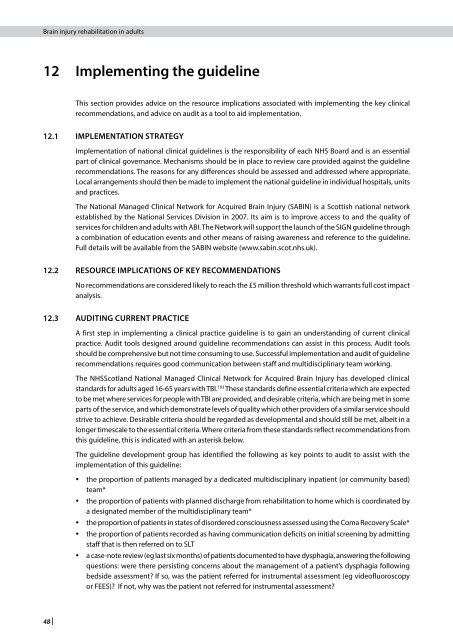sign130
sign130
sign130
Create successful ePaper yourself
Turn your PDF publications into a flip-book with our unique Google optimized e-Paper software.
Brain injury rehabilitation in adults<br />
12 Implementing the guideline<br />
48 |<br />
This section provides advice on the resource implications associated with implementing the key clinical<br />
recommendations, and advice on audit as a tool to aid implementation.<br />
12.1 IMPlEMENTATIoN STRATEGy<br />
Implementation of national clinical guidelines is the responsibility of each NHS Board and is an essential<br />
part of clinical governance. Mechanisms should be in place to review care provided against the guideline<br />
recommendations. The reasons for any differences should be assessed and addressed where appropriate.<br />
Local arrangements should then be made to implement the national guideline in individual hospitals, units<br />
and practices.<br />
The National Managed Clinical Network for Acquired Brain Injury (SABIN) is a Scottish national network<br />
established by the National Services Division in 2007. Its aim is to improve access to and the quality of<br />
services for children and adults with ABI. The Network will support the launch of the SIGN guideline through<br />
a combination of education events and other means of raising awareness and reference to the guideline.<br />
Full details will be available from the SABIN website (www.sabin.scot.nhs.uk).<br />
12.2 RESouRCE IMPlICATIoNS of KEy RECoMMENDATIoNS<br />
No recommendations are considered likely to reach the £5 million threshold which warrants full cost impact<br />
analysis.<br />
12.3 AuDITING CuRRENT PRACTICE<br />
A first step in implementing a clinical practice guideline is to gain an understanding of current clinical<br />
practice. Audit tools designed around guideline recommendations can assist in this process. Audit tools<br />
should be comprehensive but not time consuming to use. Successful implementation and audit of guideline<br />
recommendations requires good communication between staff and multidisciplinary team working.<br />
The NHSScotland National Managed Clinical Network for Acquired Brain Injury has developed clinical<br />
standards for adults aged 16-65 years with TBI. 193 These standards define essential criteria which are expected<br />
to be met where services for people with TBI are provided, and desirable criteria, which are being met in some<br />
parts of the service, and which demonstrate levels of quality which other providers of a similar service should<br />
strive to achieve. Desirable criteria should be regarded as developmental and should still be met, albeit in a<br />
longer timescale to the essential criteria. Where criteria from these standards reflect recommendations from<br />
this guideline, this is indicated with an asterisk below.<br />
The guideline development group has identified the following as key points to audit to assist with the<br />
implementation of this guideline:<br />
y the proportion of patients managed by a dedicated multidisciplinary inpatient (or community based)<br />
team*<br />
y the proportion of patients with planned discharge from rehabilitation to home which is coordinated by<br />
a designated member of the multidisciplinary team*<br />
y the proportion of patients in states of disordered consciousness assessed using the Coma Recovery Scale*<br />
y the proportion of patients recorded as having communication deficits on initial screening by admitting<br />
staff that is then referred on to SLT<br />
y a case-note review (eg last six months) of patients documented to have dysphagia, answering the following<br />
questions: were there persisting concerns about the management of a patient’s dysphagia following<br />
bedside assessment? If so, was the patient referred for instrumental assessment (eg videofluoroscopy<br />
or FEES)? If not, why was the patient not referred for instrumental assessment?


